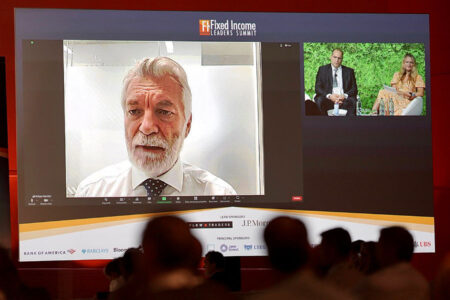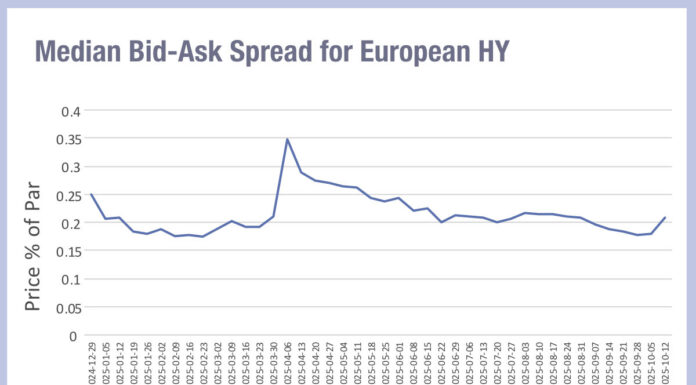At FILS 2023, Amir Fergani head of fixed income France & EMEA at Generali Insurance Asset Management, Philippe Waechter, chief economist at Ostrum Asset Management and Stefan Hofrichter, chief economist at Allianz Global Investors, looked to predict when, or if, a recession is likely to come to bear, the difference in economic outlook on both sides of the Atlantic, the stickiness of inflation, and the landscape for emerging markets with an ailing China less willing to act as financier.

“I think we have to distinguish between the US and Europe. We do not have the same story on both sides of the Atlantic,” Waechter said, kicking off the discussion, and anticipating “mild recession” coming to Europe, led by Germany. He also noted a likelihood of a change in the labour market, which will see the capacity for employees to negotiate higher salaries decrease, slowing the momentum of wage growth. Core inflation will also be lower in the coming months, Waechter also said, “a good thing for the European Central Bank (ECB)”.
Given all this and the fact that “China doesn’t play the role it used to play”, Waechter believes there is a risk of a recession in Europe, possibly in Q3 or Q4 of 2023. Although recession in the US is less likely, internal political disharmony, namely a government shutdown, is of some concern. On where risky assets, particularly credit assets are sitting, and the long-term implications, Waechter also distinguished between the stories in Europe and the US, with investors expecting stronger potential growth in the latter. “We have a very proactive fiscal policy in the US,” he said. “We don’t see this kind of situation in Europe.”
A lack of investment and industrial policy means the continent does not have the “momentum dynamics” of the US with its Inflation Reduction Act and sizable investments. On emerging markets, and particularly in APAC particularly how central bank policies are impacting portfolio allocation and what opportunities there are in the field of fixed income, Waechter said it is becoming “complicated” for Japan’s central bank now thanks to the yield curve control. “Japanese rates will probably be higher in the future than they used to be and Japan will not be able to control the yield curve as they used to, even two or three years ago,” he said.

Nonetheless, across the US and Europe, the strategy is to manage long term rates and reduce the size of balance sheets. Fergani’s suggestion for emerging markets is to employ diversification, pointing to some “attractive” local debt such as Brazil, Indonesia. “For insurance companies, such as European insurance companies, in terms of capital spend, it is quite punitive,” he said. “So you need to have a decent pickup in terms of yield to be able to invest and to diversify the portfolios, but it makes sense to go into bonds.”
Looking ahead, Waechter believes that China’s economy is in the doldrums and that it will not recover and become the leader it used to be, economically speaking. ”It will be very important on the political side, but the economy in China is really weak.” Overall, the issue with a lot of emerging markets, Waechter said, is how they will be able to fund development, many of them in Africa, without China acting as the banker of emerging markets. Fergani pointed to the new reality of a post-quantitative easing world as a key dynamic impacting capital markets. “Supply-demand dynamics is something to watch out for, because you need to finance deficits, and there are a lot of deficits in developed countries,” he said.
Negative net supply in the eurozone will make it harder for governments to secure finance from the markets and Europe is going to need a lot of investment to tackle the climate crisis. “On the bond market, we have a lot of opportunities,” Fergani added, citing levels not seen for ten years or more. “It’s very interesting to invest in investment grade (IG) credit. However, the situation in the eurozone will deteriorate and China is no longer at peak health supporting the global economy.” Stefan Hofrichter, chief economist at Allianz Global Investors looked at inflation, digging into why it has been so sticky and why it may continue in some form or another for some time to come and why a US recession is likely in the first half of next year.
The consensus view of why inflation has risen over the last two-and-a-half years has been that inflation is primarily driven by two exogenous shocks: the COVID crisis, which caused major supply chain disruptions, and the energy price shock following the Russian invasion of Ukraine, he asserted. While these two forces have begun to unwind, and they are undoubtedly important drivers of inflation, Hofrichter believes that the most salient drivers are more long-term. The knock-on effects of the response to the pandemic, in which business’ were almost on a war footing, which saw double digit deficits in the US almost up to 20% and primarily financed by central banks buying up sovereign bonds. “That created a huge liquidity injection into the system, which then did not only stay in the banking sector, but was ultimately spread into a sharp increase in money growth, broad money growth,” he said.
All this excess liquidity in the system, Hofrichter said, points to some underlying inflationary pressure at least until the end of next year. In the long-term, Hofrichter outlined three ‘Ds’ driving higher rates – deglobalisation, demography, decarbonisation. Trump’s trade wars and Brexit represent a small part of this global decoupling of markets. “We know from economic theory that less trade means high inflation and inflation volatility,” Hofrichter reasoned. In terms of demographics, the world is getting older and labour is becoming more scarce. “This is a trend that has been going on for quite some time already and explains why wage pressure is here structurally, not just for political reasons,” Hofrichter said.
Decarbonisation, which will see a greening of the financial system and the migration to a green economy, will add 0.1 to 0.2% of inflation every year in the Western world. “Now, that doesn’t sound a lot, but if you add it all up, we shouldn’t be surprised that inflation could really stay in the two to four percentage range for the next couple of years, significantly above what the central banks are targeting,” he said.
Additionally, looking back over history, once we have been in a high inflationary regime, inflation tends to be sticky, he noted, and added that at this juncture for investors, the liquidity that was injected by the central banks, notably following the COVID crisis, has also been quite supportive for risk appetite among investors in the private market and private sector overall with credit growth also picking up sharply. “We have seen quite a real leveraging in the private sector and at the same time a lot of that money was invested in real estate,” he said. “So, we’ve also seen quite a rise in real estate prices around the world.” If you combine the two dynamics, private sector leverage and house price dynamics, Hofrichter noted, you have a concept that the Bank for International Settlements (BIS) calls the ‘financial cycle’. “What this reveals is that when the financial cycle is upward sloping, it’s good for the economy, that the economy is leveraging up, that’s good for growth,” he said. “On the other hand, when we are turning downward, which is the case today, basically around the world, then you have a very high risk of a recession within a three year period.”
Hofrichter said he expects rates will be higher for longer and that looking to the past, we have seen that towards the end of rate hike cycle, markets tend to become too overpriced. “We see currently a further rise in energy prices, lifting inflation, the Bank of Japan has barely started normalising its policy,” he explained. “All these are factors that could really still weigh on the bond market and bring bond yields up a little bit further.” Hofrichter said that with inflation being so sticky, a recession is “very likely” in the US in H1 2024, and that the financial stability risks should not be downplayed.
He highlighted the “latent risk” within the nonbank sector of the financial services industry, the shadow banking sector and hedge funds, which all make up a bigger market share than the traditional banking sector. “We know very little about the interconnectedness of these players with each other, but also with the banking system,” he warned. “So that’s a potential risk that we have to keep in mind.”
©Markets Media Europe 2023
©Markets Media Europe 2025













